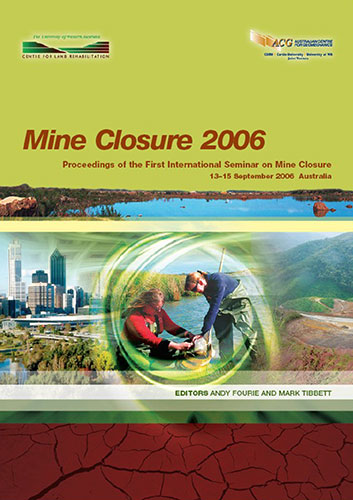Experimentation into Use of Shallow Covers in Rehabilitation of Sulphidic Mine Tailings, Stawell Gold Mine, Victoria, Australia

|
Authors: Watkins, RT; Doronila, AI; Oldmeadow, DWGT; Baker, AJM Paper is not available for download Contact Us |
DOI https://doi.org/10.36487/ACG_repo/605_26
Cite As:
Watkins, RT, Doronila, AI, Oldmeadow, DWGT & Baker, AJM 2006, 'Experimentation into Use of Shallow Covers in Rehabilitation of Sulphidic Mine Tailings, Stawell Gold Mine, Victoria, Australia', in AB Fourie & M Tibbett (eds), Mine Closure 2006: Proceedings of the First International Seminar on Mine Closure, Australian Centre for Geomechanics, Perth, pp. 329-339, https://doi.org/10.36487/ACG_repo/605_26
Abstract:
This paper provides an overview of ecological and geochemical research into rehabilitation of sulphidic tailings undertaken on purpose-built facilities at Stawell Gold Mine from May 2001 to March 2006. The field trials were preceded by glasshouse studies that indicated the rehabilitation strategies most likely to prove successful. Results of these studies into the growth of grasses and eucalypts, the influence of mycorrhizae on growth, and the uptake of arsenic and metals into plant tissues are not reported in detail here, although their relation to the field trials and implications for rehabilitation are discussed. The experimentation was designed to test the efficacy of thin, permeable covers in future rehabilitation of a 100 ha tailings storage facility (TSF). The trialled covers, which were designed to provide a more environmentally sustainable alternative to the proscribed impermeable cover, involved amendment of fresh tailings with locally derived materials to generate substrates suitable for plant growth. Within the time limitations of the field studies, it is concluded that cultivation of selected native Australian trees and grasses is practical on sulphidic tailings at Stawell after simple amendment of the surface, and this may provide a sustainable vegetative cover able to restrict surface erosion and release of acidic drainage, while imparting value to the rehabilitated land for the local community.
References:
Armstrong, W. (1967) The oxidizing activity of roots in waterlogged soils. Physiologia Plantarum 20, pp. 920-926.
Armstrong, W. and Drew, M. (2002) Root growth and metabolism under oxygen deficiency. in Plant roots: the hidden
half 3rd edition revised and expanded, Y. Waisal, A. Eshel and U. Kafkafi (eds), pp. 717-728. Marcel Dekker
Inc., New York.
Ashley, P.M. and Lottermoser, B.G. (1999) Arsenic contamination at the Mole River mine, northern New South Wales.
Australian Journal of Earth Sciences 46, pp. 861-874.
Batty, L.C., Baker, A.J.M., Wheeler, B.D. and Curtis, C.D. (2000) The effect of pH and plaque on the uptake of Cu and
Mn in Phragmites australis (Cav.) Trin ex. Steudel. Annals of Botany 86, pp. 647-653.
Bengough, A.G. (2003) Root growth and function in relation to soil structure, composition and strength. In Root
Ecology, H. de Kroon and E. J. W. Visser (eds), pp. 151-168. Springer Verlag, Berlin.
Buchanan, R.A. (1989) Bush regeneration: Recovering Australian landscapes. TAFE New South Wales.
Burgess, S.O., Adams, M.A., Turner, N.C., White, D.A. and Ong, C.K. (2001) Tree roots: conduits for deep recharge of
soil water. Oecologia 126, pp. 158-165.
Chen, Z., Zhu, Y.G. and Liu, W.J. (2005) Direct evidence showing the effect of root surface iron plaque on arsenite and
arsenate uptake into rice (Oryza sativa) roots. New Phytologist 165, pp. 91-97.
Costello, J., Lacy, H., Rengel, Z., Jasper, D. and Quaghebeur, M. (2004) Uptake of arsenic by native plants on gold
tailings in Western Australian rangelands. In Goldfields Environmental Management Group 2004 workshop on
environmental management in arid and semi-arid areas, Kalgoorlie, Western Australia, pp. 79-90.
Dalton, G. (1993) Direct seeding of trees and shrubs: a manual for Australian conditions. Primary Industries S.A. 123 p.
DeKoe, T. (1994) Agrostis castellana and Agrostis delicatula on heavy metal and arsenic enriched sites in NE Portugal.
The Science of the Total Environment 145, pp. 103-109.
Falkiner, R., Theiveyanathan, T., Marcar, N., Myers, B. and Stewart, L. (2004) Heartlands low to medium rainfall farm
forestry: A report of the heartlands Initiative. Publication HL10-04. CSIRO Forestry and Forest Products, 62 p.
Rokich, D.P., Meney, K.A., Dixon, K.W. and Sivasithamparam, K. (2001) The impact of soil disturbance on root
development in woodland communities in Western Australia. Australian Journal of Botany 49, pp. 169-183.
Venning, J. (1988) Growing trees for farms, parks and roadsides: a revegetation manual for Australia. Lothian
Publishing: Melbourne, 126 p.
Ecosystem Reconstruction and Pedogenesis
Mine Closure 2006, Perth, Australia 339
© Copyright 2026, Australian Centre for Geomechanics (ACG), The University of Western Australia. All rights reserved.
View copyright/legal information
Please direct any queries or error reports to repository-acg@uwa.edu.au
View copyright/legal information
Please direct any queries or error reports to repository-acg@uwa.edu.au